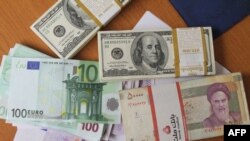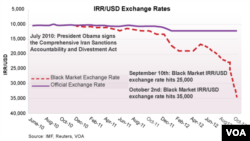A senior hardline Iranian cleric used Friday prayers to reassure Iranians they will overcome the recent plunge in the value of the country’s currency, as public frustration with the crisis turned from street protests to online mockery.
Ayatollah Ahmad Khatami told worshippers at Tehran University “these pressures won’t last,” according to the semi-official Mehr News Agency.
Khatami also urged politicians not to blame each other using the media because it was what the Western media wanted to see, the report said. He told the Iranian people it was their right to be upset, but that reacting through chaos and uproar was what the “enemy” wanted.
Khatami added that Iran “has proven that it will not be worn down by pressures and has experienced how to live with problems.”
On Tuesday, Iranian President Mahmoud Ahmadinejad blamed the latest economic woes on “psychological pressures” linked to Western sanctions and criticized politicians who said his policies have exacerbated the collapse of the currency.
The rial has lost a third of its value in the past several days and dropped as much as 80 percent over the past year, further compromising Iran’s already shaky economy. Iran’s official inflation rate is 25 percent. Western sanctions have severely restricted the country’s ability to sell oil on the world market and limited its access to the international banking system.
A young engineer in Tehran told VOA his construction business is suffering from the increase in prices.
“Iron material used to be 9,000 rials per kilo last year. Now it’s 20,000 rials,” he said. “Two weeks ago, a polystyrene that we used had increased in price by 20 percent, but in the past few days, it is no longer sold because the material is imported from South Korea.”
He said there are many other examples of the challenges facing Iranians.
“I wanted to buy a new car, but the national car companies are no longer registering or even pre-registering [vehicles] for sale because they want to increase their prices due to the increase in dollar rates, but the parliament does not allow them,” he said.
An Iranian software developer who works in Dubai and travels to Tehran frequently told VOA that not only have prices increased, but the quality of goods has declined as well.
“My friend who has MS [multiple sclerosis] used to buy a better quality medicine made in Europe. Now that brand is no longer sold in the market, so he pays more for a lower quality brand, and he can feel the effect,” the source said.
He said life feels like it was back in the Iran-Iraq war years of the 1980s, when goods were scarce.
“The quality of national brands has declined, and imported goods are much more expensive and hard to find. Every time I travel back, my friends ask for stuff such as Gillette razors.”
The rial has lost so much value that it has inspired a popular joke in Iran, which suggests even a homeless person in New York can use their change to stay at the posh Dariush Grand Hotel on the resort island of Kish in the Persian Gulf.
The joke echoes criticism leveled against Ahmadinejad for his spending during his recent trip to New York for the U.N. General Assembly, where he travelled with more than 100 people in his entourage.
Parliament member Jafar Ghaderia criticized Ahmadinejad, saying it would have been better for the president to spend that money on industry rather than his delegates.
On social media, Iranians are using satire as a safe way to protest. Some popular jokes include “Farewell Turkey. Hello Caspian” and “Goodbye Adidas and Timberland, Hello Kafsh Melli,” referring to an Iranian brand of shoe. The same joke is made even about small items like chewing gum, where it goes “Farewell Orbit, hello Shik,” an Iranian brand.
Ayatollah Ahmad Khatami told worshippers at Tehran University “these pressures won’t last,” according to the semi-official Mehr News Agency.
Khatami also urged politicians not to blame each other using the media because it was what the Western media wanted to see, the report said. He told the Iranian people it was their right to be upset, but that reacting through chaos and uproar was what the “enemy” wanted.
Khatami added that Iran “has proven that it will not be worn down by pressures and has experienced how to live with problems.”
On Tuesday, Iranian President Mahmoud Ahmadinejad blamed the latest economic woes on “psychological pressures” linked to Western sanctions and criticized politicians who said his policies have exacerbated the collapse of the currency.
The rial has lost a third of its value in the past several days and dropped as much as 80 percent over the past year, further compromising Iran’s already shaky economy. Iran’s official inflation rate is 25 percent. Western sanctions have severely restricted the country’s ability to sell oil on the world market and limited its access to the international banking system.
A young engineer in Tehran told VOA his construction business is suffering from the increase in prices.
“Iron material used to be 9,000 rials per kilo last year. Now it’s 20,000 rials,” he said. “Two weeks ago, a polystyrene that we used had increased in price by 20 percent, but in the past few days, it is no longer sold because the material is imported from South Korea.”
He said there are many other examples of the challenges facing Iranians.
“I wanted to buy a new car, but the national car companies are no longer registering or even pre-registering [vehicles] for sale because they want to increase their prices due to the increase in dollar rates, but the parliament does not allow them,” he said.
An Iranian software developer who works in Dubai and travels to Tehran frequently told VOA that not only have prices increased, but the quality of goods has declined as well.
“My friend who has MS [multiple sclerosis] used to buy a better quality medicine made in Europe. Now that brand is no longer sold in the market, so he pays more for a lower quality brand, and he can feel the effect,” the source said.
He said life feels like it was back in the Iran-Iraq war years of the 1980s, when goods were scarce.
“The quality of national brands has declined, and imported goods are much more expensive and hard to find. Every time I travel back, my friends ask for stuff such as Gillette razors.”
The rial has lost so much value that it has inspired a popular joke in Iran, which suggests even a homeless person in New York can use their change to stay at the posh Dariush Grand Hotel on the resort island of Kish in the Persian Gulf.
The joke echoes criticism leveled against Ahmadinejad for his spending during his recent trip to New York for the U.N. General Assembly, where he travelled with more than 100 people in his entourage.
Parliament member Jafar Ghaderia criticized Ahmadinejad, saying it would have been better for the president to spend that money on industry rather than his delegates.
On social media, Iranians are using satire as a safe way to protest. Some popular jokes include “Farewell Turkey. Hello Caspian” and “Goodbye Adidas and Timberland, Hello Kafsh Melli,” referring to an Iranian brand of shoe. The same joke is made even about small items like chewing gum, where it goes “Farewell Orbit, hello Shik,” an Iranian brand.














